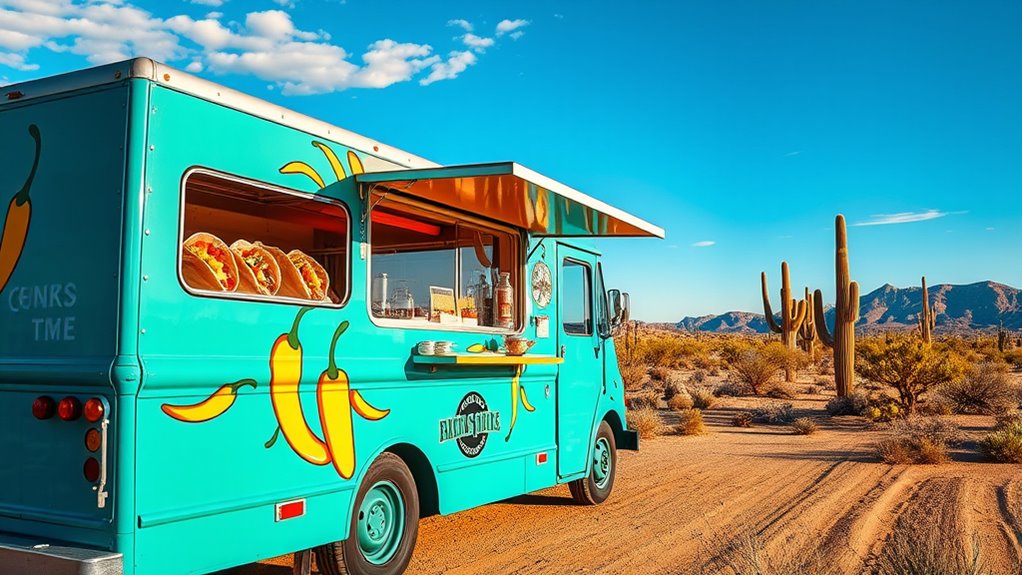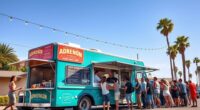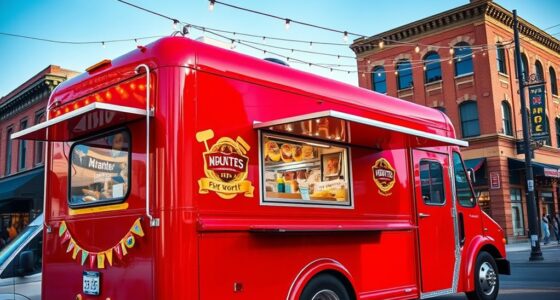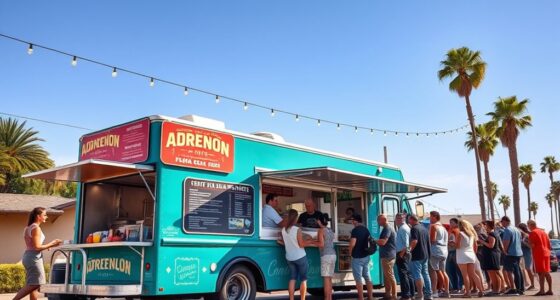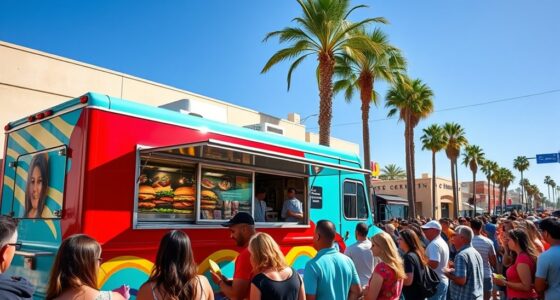Starting a food truck in Tucson means embracing its rich mix of Native American, Hispanic, and Western flavors, offering your unique dishes at busy events and popular spots. You’ll need to complete online permits, find a compliant kitchen, and set up effective sanitation and record-keeping systems. To succeed, focus on appealing menus, smart pricing, and engaging marketing like loyalty programs and local event participation. Keep exploring these strategies to build a thriving food truck business in Tucson.
Key Takeaways
- Research Tucson’s diverse food culture and incorporate regional flavors, local ingredients, and healthy options into your menu.
- Complete online permits, understand parking zones, and ensure compliance with health regulations via Tucson’s city portal.
- Establish sanitation routines, maintain detailed records, and utilize technology like POS systems for efficient operations.
- Plan marketing strategies including event participation, social media promotion, and customer loyalty programs to build community presence.
- Seek funding through grants, investor networks, or crowdfunding, and consider insurance and cost management for a successful launch.
Food Culture in Tucson
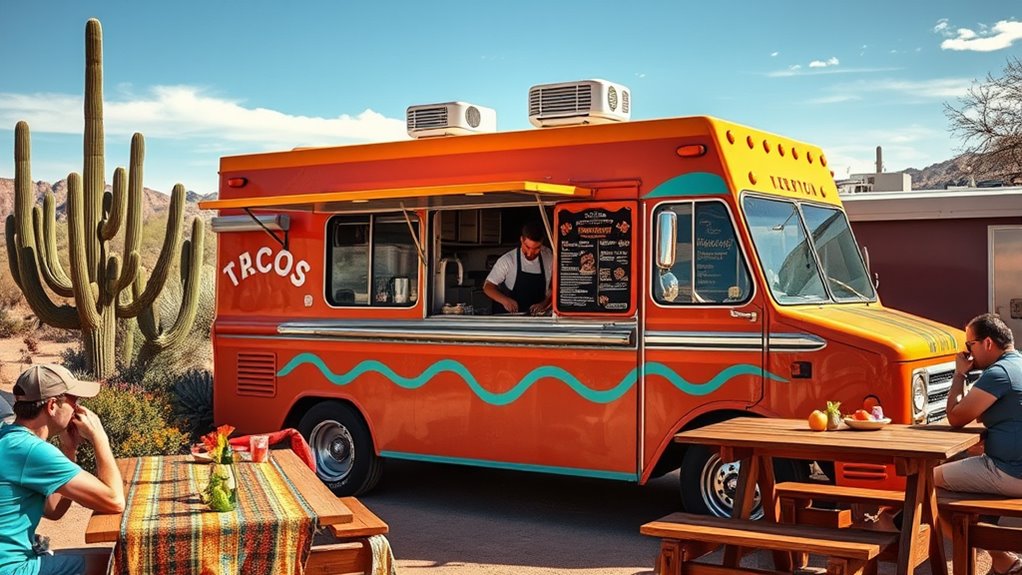
Ever wonder what makes Tucson’s food scene so vibrant? It all boils down to rich Tucson food traditions that blend Native American, Hispanic, and Western flavors. This unique mix creates a diverse culinary landscape that’s perfect for food trucks. Local culinary festivals celebrate these traditions, giving you opportunities to connect with the community and showcase your offerings. These festivals attract large crowds enthusiastic to taste authentic dishes, making them excellent platforms for promotion. Tucson’s love for bold flavors and fresh ingredients fuels a passionate food culture. As a food truck operator, understanding and embracing these traditions helps you stand out. Incorporating low carb foods and healthy options can appeal to health-conscious customers while respecting local flavors. You’ll find plenty of inspiration here, whether it’s through traditional recipes or innovative twists rooted in local history.
Understanding Local Requirements
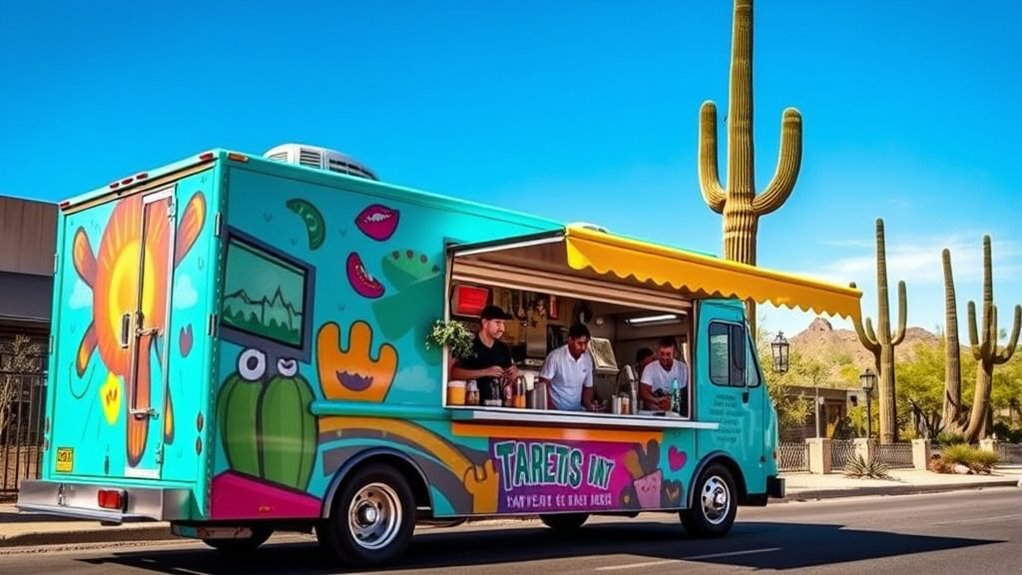
To get your food truck up and running in Tucson, you need to understand the local requirements. This includes completing the online permit application, following sanitation protocols, and keeping proper records. You should also familiarize yourself with designated parking zones to avoid fines and ensure smooth operations. Additionally, understanding local health regulations can help you maintain compliance and ensure the safety of your customers.
Online Permit Application Process
Guiding Tucson’s online permit application process is an essential step to safeguard your food truck complies with local health and safety regulations. To start, visit the Tucson city website and locate the online permit portal. The application process is straightforward, requiring you to fill out detailed information about your food truck, menu, and operational plans. Be prepared to upload necessary documents, such as proof of insurance and health certificates. Carefully review each section to ensure accuracy, as errors can delay approval. Once submitted, keep track of your application status through the portal. Respond promptly to any follow-up requests from city officials. Completing the online permit application process efficiently helps you move closer to launching your food truck legally and smoothly in Tucson.
Sanitation Protocols and Record-Keeping
After completing your online permit application, understanding and following local sanitation protocols becomes the next essential step to guarantee your food truck operates safely and complies with Tucson’s health regulations. You must prioritize food safety by adhering to strict cleaning schedules for all surfaces, utensils, and equipment. Regular cleaning helps prevent cross-contamination and keeps your truck sanitary. Keep detailed records of your cleaning routines, including dates and tasks performed, as health inspectors often review these logs during inspections. Staying organized and consistent with sanitation protocols not only ensures compliance but also builds customer trust. Familiarize yourself with Tucson’s specific health department requirements, and regularly review updates to sanitation standards to maintain high food safety practices.
Designated Truck Parking Zones
Understanding designated truck parking zones in Tucson is crucial for ensuring your food truck operates legally and smoothly. Tucson has specific areas where trucks can park, helping you avoid fines or penalties. Knowing these zones also supports proper truck maintenance by preventing unnecessary wear from illegal parking. When selecting a parking spot, consider how it aligns with your vehicle branding strategy—an accessible, visible location can boost your marketing efforts. Always check local ordinances and zoning requirements before parking your truck. Properly parked trucks not only stay compliant but also improve your reputation with customers. By respecting designated zones, you guarantee your food truck remains operational, well-maintained, and aligned with Tucson’s regulations. This approach keeps your business running efficiently and avoids costly disruptions.
Setting Up Your Base of Operations
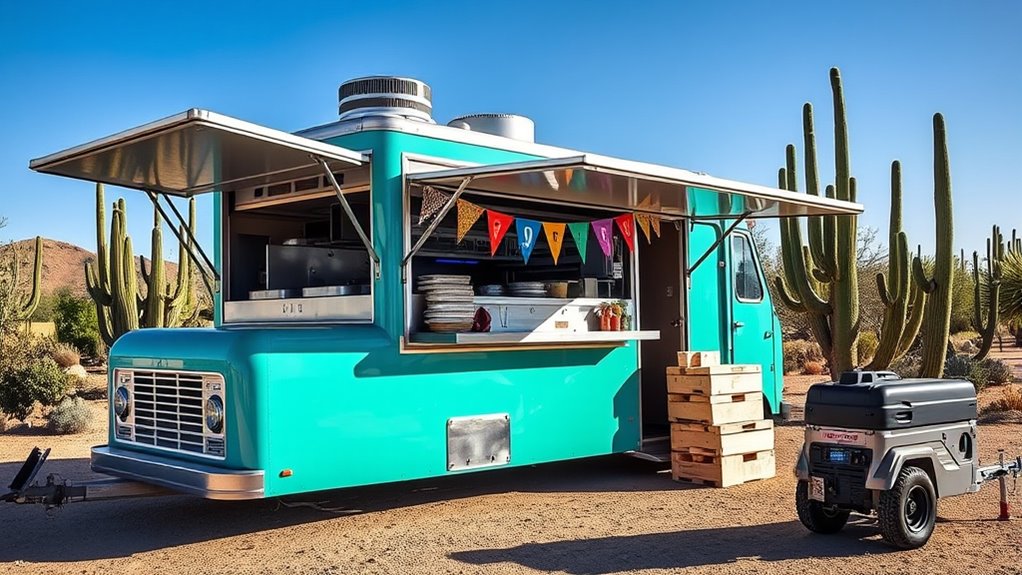
Choosing the right shared kitchen licensing options can save you time and money while meeting health regulations. You’ll also want to select custom kitchen equipment that fits your menu and workflow. Making these decisions now sets a strong foundation for your food truck’s success in Tucson. Additionally, understanding paint sprayer technology can help you choose durable and efficient equipment if you’re considering branding or customizing your truck’s exterior.
Shared Kitchen Licensing Options
Setting up your food truck in Tucson often starts with selecting a shared kitchen, which can provide a cost-effective and flexible way to meet health department requirements. Shared kitchen licensing guarantees you comply with local food safety standards while avoiding the costs of a dedicated space. When exploring co-working kitchen regulations, you’ll find options that suit small-scale operations and allow for easy scheduling. Key considerations include:
- Guaranteeing the shared kitchen holds the proper shared kitchen licensing
- Verifying the facility meets all local health code standards
- Understanding restrictions on menu preparation and storage
- Confirming your use aligns with co working kitchen regulations and permits
Choosing the right shared kitchen simplifies compliance, saves money, and helps you get your food truck business off the ground smoothly.
Custom Kitchen Equipment Selection
Selecting the right custom kitchen equipment is vital to creating an efficient and functional base for your food truck. Start with a well-designed custom kitchen design that maximizes space and meets your menu needs. Choose durable, high-quality appliances that withstand daily use, and ensure they’re properly integrated into your layout for smooth workflow. Keep in mind that equipment maintenance is essential; regular cleaning and servicing prevent breakdowns and extend equipment lifespan. Consider versatile pieces that can serve multiple functions, saving space and money. When selecting your equipment, think about how each piece fits into your overall kitchen design and operations. A thoughtful approach to custom kitchen design and maintenance ensures your food truck runs smoothly, reducing downtime and increasing customer satisfaction.
Budgeting and Financing Your Food Truck
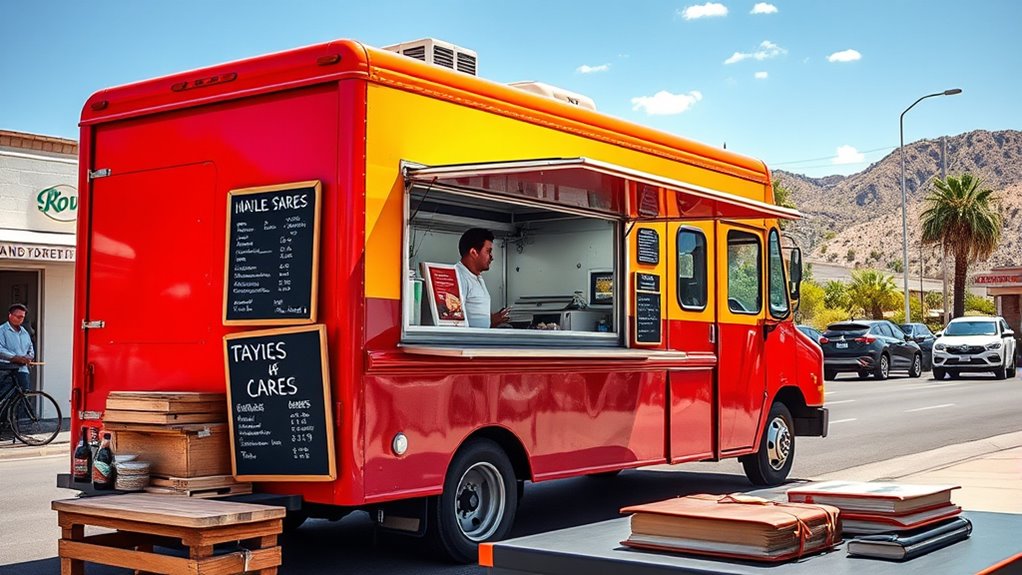
To get your food truck rolling, you need to plan your budget carefully, covering vehicle modifications, startup costs, and insurance. Exploring different funding options and strategies can help you secure the capital you need without stretching your finances too thin. Don’t forget to factor in liability insurance to protect your business as you hit the Tucson streets. Additionally, researching best financing options can provide valuable insights into securing the necessary funds efficiently.
Initial Vehicle Modifications
Budgeting for your food truck’s initial vehicle modifications is a crucial step to make sure you stay financially on track. You’ll need funds for essential vehicle customization to optimize cooking space, guarantee safety, and meet health regulations. Consider costs related to installing appliances, exhaust systems, and shelving. Keep in mind ongoing maintenance routines, which prevent costly repairs later. To manage expenses effectively, plan for:
- Upgrading electrical and plumbing systems
- Reinforcing the truck’s structure for durability
- Adding branding elements like signage
- Ensuring proper insulation and ventilation
Startup Capital Sources and Strategies
Securing the right funding is key to turning your food truck idea into reality. You can explore various financing grants available for small businesses, especially those supporting local entrepreneurs. These grants don’t require repayment and can help cover equipment or startup costs. Additionally, tapping into investor networks can provide crucial capital, especially if you’re ready to pitch your concept. Building relationships with investors who believe in your vision can lead to funding and mentorship. Consider crowdfunding platforms as well, which allow you to raise capital from a broad audience. Carefully budgeting your expenses and identifying suitable funding sources will ensure you have enough capital to launch and sustain your food truck business in Tucson. The right mix of grants, investor support, and strategic planning sets you up for success.
Liability Insurance for Food Trucks
Liability insurance is a critical expense to factor into your food truck’s startup costs, as it protects you from potential legal claims and damages. Without proper coverage, an accident or food safety issue could lead to costly lawsuits or claims. It’s essential to choose the right insurance policies to safeguard your business and maintain consumer trust. When selecting coverage, consider these factors:
- Coverage limits related to food safety incidents
- Types of damages included in your policies
- Whether the policy covers property damage or injuries
- The reputation and reliability of the insurance provider
Having extensive insurance policies ensures you’re prepared for unforeseen events, helping you focus on growing your food truck business in Tucson. Proper liability coverage not only protects your assets but also demonstrates your commitment to food safety and customer well-being.
Designing Your Menu and Pricing Strategy
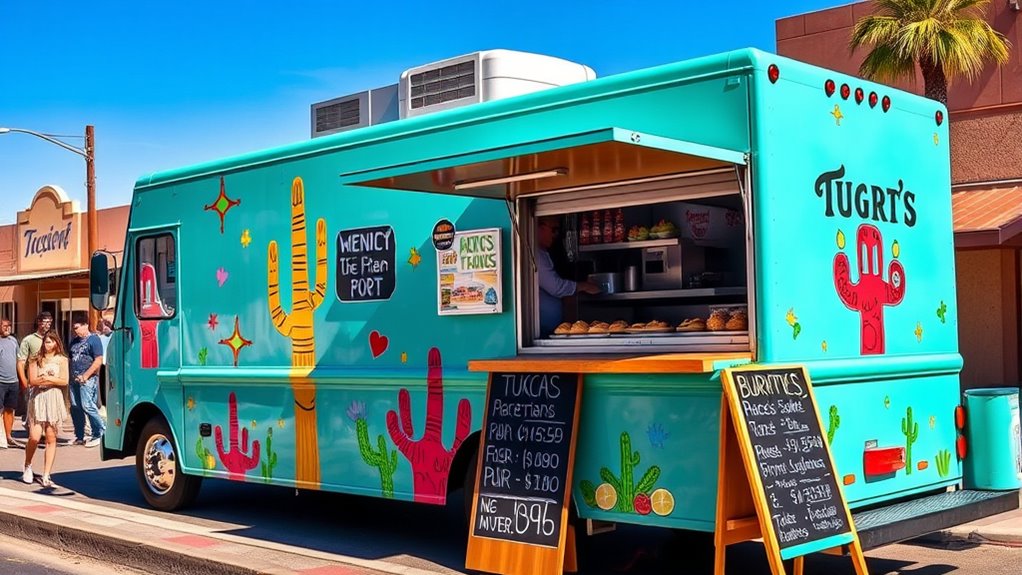
Your menu should highlight signature Tucson dishes that reflect local flavors and attract customers. To set the right prices, you need to carefully calculate the cost per dish, including ingredients and overhead. This approach guarantees your menu is both appealing and profitable. Incorporating local culinary traditions can also help differentiate your food truck and resonate with the community.
Crafting Signature Tucson Dishes
Creating a menu that highlights authentic Tucson flavors is essential for attracting customers and standing out in a competitive food truck scene. Focus on developing signature dishes that showcase local ingredients and cultural influences. To do this, prioritize ingredient sourcing from local markets to ensure freshness and support the community. Incorporate unique flavor combinations that reflect Tucson’s heritage, such as southwestern spices or regional produce. Consider offering seasonal specials to keep your menu dynamic and exciting. Here are key points to craft your signature Tucson dishes:
- Use locally sourced, fresh ingredients to enhance flavor and authenticity
- Experiment with traditional recipes, adding your unique twist
- Balance bold flavors with approachable options
- Price dishes competitively while emphasizing quality and originality
Cost per Dish Calculation
Calculating the cost per dish is a crucial step in designing your menu and setting prices that cover expenses while remaining competitive. Start by performing a thorough cost analysis of all ingredients, labor, and overhead costs for each dish. This helps you determine the true expense behind every menu item and ensures accurate dish pricing. To do this effectively, track ingredient prices, portion sizes, and preparation time, then divide the total costs by the number of servings. Knowing your cost per dish allows you to set prices that maximize profit without alienating customers. Remember, consistent cost analysis helps you identify opportunities to control costs and refine your menu. Ultimately, precise dish pricing built on detailed cost calculations ensures your food truck remains profitable and competitive in Tucson’s bustling food scene.
Technology and Operations
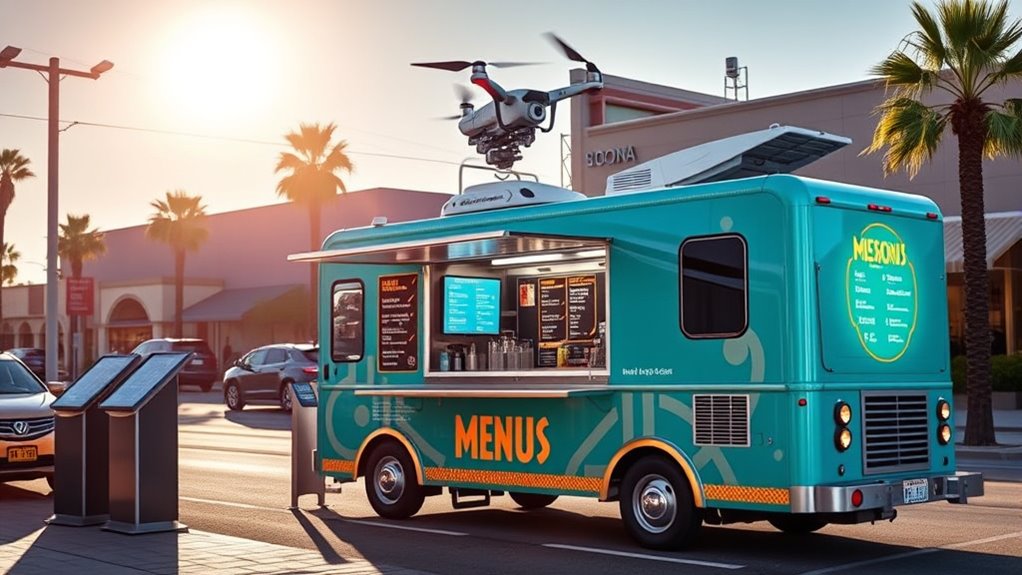
Using wireless card readers for tablets can speed up transactions and improve customer experience. Real-time stock tracking software helps you stay on top of inventory levels and avoid shortages. Incorporating these technologies streamlines your operations and keeps your food truck running smoothly.
Wireless Card Readers for Tablets
Wireless card readers for tablets have revolutionized how food truck operators process transactions on the go. They enable quick, secure mobile payment and contactless transactions, making checkout faster and more convenient for customers. With these devices, you don’t need bulky equipment or wired connections, allowing for smoother operations and better customer experiences. Key features to weigh include:
- Compatibility with multiple payment methods
- Encryption for secure transactions
- Easy integration with POS systems
- Battery life for all-day use
These qualities guarantee your business stays efficient and customer-friendly. Using wireless card readers also reduces wait times, increases sales, and enhances overall service quality—vital for thriving in Tucson’s competitive food truck scene. Staying updated with this technology helps you offer modern, seamless payment options and keeps your operation ahead.
Real-Time Stock Tracking Software
Implementing real-time stock tracking software can substantially streamline your food truck’s operations by providing instant updates on inventory levels. This technology enhances inventory management by reducing waste and preventing stockouts, ensuring you’re always prepared for busy days. It also improves delivery logistics by coordinating supply orders with actual usage, avoiding delays. You can easily monitor ingredients and supplies through a centralized dashboard, making adjustments on the fly. Here’s how it optimizes your workflow:
| Inventory Control | Delivery Coordination | Cost Efficiency |
|---|---|---|
| Prevents stockouts | Schedules deliveries | Reduces waste |
| Tracks usage in real-time | Avoids overstocking | Saves money |
| Improves accuracy | Ensures timely supplies | Boosts profit |
With this software, you stay agile and responsive, keeping your food truck ahead of the competition.
Marketing and Growing Your Presence

To grow your presence, you need to actively engage with your community through scheduling weekly event rotations and offering specials that keep customers coming back. Implement customer loyalty programs to reward regulars and encourage repeat visits. These strategies help build a strong local following and increase your food truck’s visibility in Tucson.
Scheduling Weekly Event Rotations
Scheduling weekly event rotations is essential for building your food truck’s presence and attracting a steady flow of customers. Consistently visiting popular locations helps establish your brand and boosts visibility. To maximize impact, plan your schedule around high-traffic events and community gatherings. Use your social media engagement to announce your weekly rotations and generate anticipation. Consider the following strategies:
- Schedule promotions around your event days to encourage repeat visits
- Coordinate with local event organizers for prime time slots
- Track attendance to identify the most profitable locations
- Adjust your schedule based on customer feedback and engagement metrics
Customer Loyalty Programs and Specials
Customer loyalty programs and specials are powerful tools for growing your food truck’s presence in Tucson. By offering customer rewards, you encourage repeat business and build a loyal customer base. Implementing promotional discounts, like punch cards or digital rewards, makes customers feel appreciated and more likely to return. These incentives not only boost sales but also increase word-of-mouth referrals as satisfied customers share their positive experiences. Make sure your loyalty program is simple to understand and easy to participate in—this encourages more engagement. Regularly updating your specials keeps your offerings fresh and exciting, drawing new and returning customers alike. Ultimately, well-designed customer loyalty programs and specials help you stand out in Tucson’s competitive food scene, fostering lasting relationships that grow your business.
Local Event Participation Boosts Sales
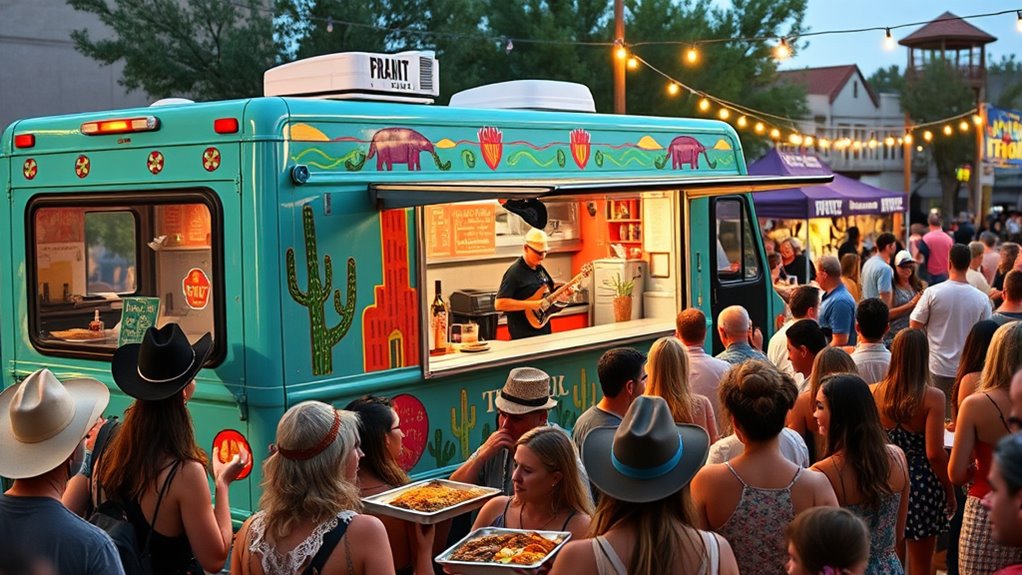
Participating in local events can substantially increase your food truck’s visibility and sales in Tucson. By engaging in community events, you connect directly with potential customers and build brand recognition. This active community engagement encourages word-of-mouth marketing and fosters loyalty. To maximize benefits, consider these strategies:
Participating in local events boosts visibility, sales, and community loyalty for your Tucson food truck.
- Choose events aligned with your target audience
- Offer exclusive event discounts or specials
- Network with other local vendors for collaborations
- Gather customer feedback for continuous improvement
Getting involved in local event participation not only boosts sales but also enhances your reputation within Tucson’s vibrant community. The more you immerse yourself, the more you’ll understand your customers’ preferences, helping your business thrive in a competitive environment.
Frequently Asked Questions
Are There Specific Health Permits Unique to Tucson?
Yes, Tucson has specific health permits you need to obtain. You must follow local health codes and complete the permit application process through Pima County Environmental Quality Department. This includes passing a health inspection, providing proof of food safety training, and submitting detailed plans for your truck’s setup. Make sure to check their website or contact them directly to get the latest requirements, ensuring your food truck complies with all Tucson regulations.
How Do Tucson’s Climate Conditions Affect Food Truck Equipment?
Think of your food truck as a sturdy ship steering through Tucson’s desert climate. The intense heat and sun demand climate resilience from your equipment. You’ll need to regularly check and maintain appliances, cooling systems, and electrical wiring to prevent damage. Proper equipment maintenance helps your truck stand strong against the sun’s relentless rays, ensuring smooth operations and delicious food, no matter how scorching the day gets.
What Are the Best Locations for Food Trucks in Tucson?
You should target popular downtown areas and the University neighborhood, as these spots attract large crowds and foot traffic. Downtown Tucson offers lively events and consistent crowds, while the University area draws students and faculty seeking quick, tasty meals. By positioning your food truck in these high-traffic locations, you maximize visibility and sales, ensuring your business thrives in Tucson’s vibrant food scene.
Is There a Local Food Truck Association or Networking Group?
Did you know Tucson hosts over 50 food truck meetups annually? Yes, there’s a vibrant network of local groups and associations that connect food truck owners. These groups often organize Tucson food events, offering great opportunities for networking, sharing tips, and growing your business. Joining a food truck association helps you stay informed about meetups and events, so you can expand your reach and connect with fellow vendors in Tucson.
How Does Tucson’s Tourism Influence Peak Business Times?
Tourism in Tucson substantially boosts your peak business times, especially during seasonal tourism peaks and festival crowds. As visitors flock to popular spots like the Tucson Gem Show or the Tucson Festival of Books, you’ll see increased foot traffic and sales. Planning your schedule around these busy periods helps maximize profits. You also want to be prepared for the influx of tourists seeking local flavors, which can translate into steady, lucrative days for your food truck.
Conclusion
Starting a food truck in Tucson is an exciting adventure—think of it as your own modern-day frontier. With passion, careful planning, and community engagement, you’ll carve out your spot in this vibrant food scene. Remember, success comes from blending the old with the new—like a trusty rotary phone in a smartphone world. Embrace the journey, stay adaptable, and soon you’ll be serving up smiles and savory bites that Tucson can’t resist.
